Are you in the market for a tongue scraper? Want to know the best way to clean your tongue? Or just wondering if tongue scraping is a necessary part of your oral hygiene routine in the first place?
We're here to help answer all these questions and more in our comprehensive guide to cleaning your tongue. Keep reading for information about:
- The benefits of tongue scraping
- How to find the best tongue scraper for you in the UK
- The best tongue cleaning technique
- How to clean the back of your tongue without gagging
- Other ways to keep your tongue clean
Below you can view a quick guide to our top picks, but keep reading to learn a lot more about these and other models.
[wptb id="26197" not found ]In This Article
Should you clean your tongue?
The concept of tongue scraping is relatively new to the UK, but it has been practised in many cultures for centuries. We all know about twice-daily brushing and flossing, but tongue cleaning is important as well. Chances are it's not something your dentist has recommended; flossing and twice-daily brushing are probably higher on their agenda. However, start incorporating tongue cleaning into your daily oral hygiene routine and you may notice a number of benefits.
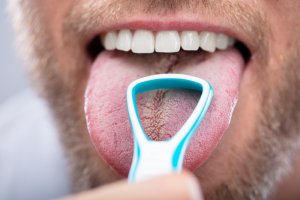
The aim of a tongue scraper is to remove the buildup of bacteria, debris and dead cells which is constantly accumulating on your tongue. This coating on your tongue can be made worse by a number of factors including:
- Smoking
- Certain medications
- Dry mouth
- Oral thrush
- Insufficient oral care
Certain bacteria can cause white/yellow coating on the tongue. The white colour may be due to the accumulation of bacteria, dead cells, and debris, whereas a yellow coating may imply a fungal infection (Candida).
The bacteria which build up on the tongue can form plaque, which in turn contributes to bad breath, tooth decay, and gum disease. According to this study from 2014, tongue cleaning was found to reduce the amount of bacteria in the tongue coating, although it didn't inhibit the formation of dental plaque. Thus, the study concluded, tongue cleaning should be performed alongside tooth brushing to reduce the amount of bacterial load in the mouth.
Benefits of tongue scraping
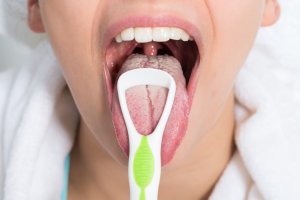
Research on tongue scraper benefits is still quite limited, but cleaning your tongue at least twice a day could help improve any of the following:
- Bad breath: Bacteria and food particles embedded in crevices in the tongue are a major cause of bad breath. Clean them off, and your mouth will feel much fresher. Read our full guide to bad breath causes and treatments for more tips, plus warning signs of a more serious problem.
- Appearance: A heavy white buildup on your tongue looks and feels unpleasant. Use a tongue scraper to clean your white tongue, and make sure you're drinking enough water.
- Sense of taste: A physical coating over your taste buds might be stopping you from experiencing the full flavours of the food you eat.
- Overall better oral health: Sometimes bacteria from tongue can develop into dental caries or gum disease, so a cleaner tongue contributes to your overall better oral health.
Halitosis is commonly known as ‘Bad breath’. How can you find out if you have bad breath? You can either lick the back of a spoon and smell it or floss towards the back of your mouth and smell the floss. If you do have bad breath, then there are multiple causal factors for it and the tongue coating is one of them.
You can choose a tongue scraper that works best for you and incorporate it into your oral hygiene routine. It is easier and convenient to just use a toothbrush to clean your tongue, but it’s not going to be as effective as a tongue scraper.
Brush, floss, and scrape for a healthier smile!
Dr Asha Ramesh
If you think you're suffering from chronic bad breath (halitosis) or your tongue is painful or discoloured, you should visit your dentist for a checkup.
Can you brush your tongue with a toothbrush?
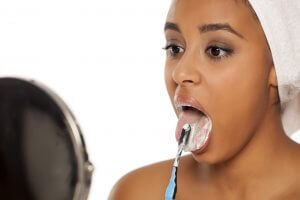
There are a couple of reasons why this is not the best way to clean your tongue. Firstly, toothbrush bristles are great for cleaning hard tooth enamel, but not the soft spongy surface of your tongue. This means that toothbrushes are less effective than tongue scrapers at removing volatile sulphur compounds (VSCs) – a big contributor to bad breath. This study from 2004 only monitored 10 people but found that a tongue scraper was 67% more effective than a toothbrush at removing VSCs.
Secondly, chunky toothbrush heads can easily trigger your gag reflex when you try to clean the back of your tongue. They're just not designed to be used in that part of your mouth.
What about a toothbrush with a built-in tongue cleaner?
Perhaps you have tried to brush your tongue using a toothbrush with a tongue scraper on the reverse. This might be slightly more effective at removing bacteria than just brushing your tongue with a toothbrush, but the problem with gagging remains. Plus, it's difficult to know if you've effectively cleaned the full surface of your tongue.
If you haven't had much success with this method and want to know how to brush your tongue without gagging, the solution could be to buy a tongue scraper. Not only are these devices much thinner than a toothbrush, they also make cleaning your tongue simpler and quicker.
In the short video below, oral heath therapist Laura demonstrates why she recommends using a tongue scraper rather than a toothbrush for tongue cleaning:
How to clean your tongue with a tongue scraper
The best way to clean your tongue with a tongue scraper is by following these simple steps:
- Stick your tongue as far out of your mouth as it will comfortably go.
- Place the tongue scraper as far back as you can without gagging.
- Exert enough force that the scraper sits flat against your tongue (but not so much that it hurts).
- Slowly pull it forwards to the tip of your tongue.
- Spit out any saliva and debris that has accumulated on your tongue, and rinse or wipe any gunk off the scraper.
- Repeat several times, ensuring you have scraped the whole surface of your tongue.
- Wash your tongue scraper under running water and leave it out to dry.
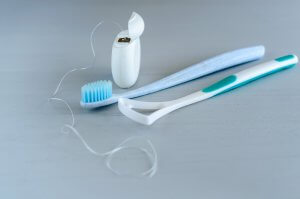
Now you know how to use a tongue scraper, it's easy to add this to your daily hygiene routine. The whole process should take less than a minute. You can clean your tongue twice a day, when you brush your teeth (check if you're brushing your teeth correctly here). But in fact, you can scrape your tongue more often than this. People who are especially conscious of bad breath might clean their tongues after drinking coffee, smoking, or eating strongly scented foods, for instance.
Note that you shouldn't rinse your mouth with water or mouthwash if you have just brushed your teeth. This washes away the beneficial ingredients in your toothpaste. If you prefer to rinse your mouth after scraping your tongue then do it before, not after, brushing your teeth.
If you have problems with gagging when you clean the back of your tongue, you're not alone. After you get used to the sensation of scraping your tongue, you might find it becomes easier to place the scraper further back in your mouth without gagging. Some people find that a heavier metal tongue scraper is less likely to trigger their gag reflex than a lighter plastic one.
Choosing the best tongue scraper for you
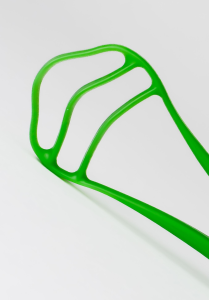
Tongue scrapers come in various different shapes and materials, the main differences being between plastic and metal tongue scrapers. You'll find the best selection of tongue scrapers in the UK if you look online. Below we take a look at some popular options and explain how you can decide on the best tongue scraper for you.
Plastic tongue scrapers
Let's begin with the plastic variety. These usually have a long handle similar to a toothbrush handle, and a tip with one or more bars which scrape along the tongue. They might also have small bristles to help dislodge particles from the surface of the tongue.
Plastic tongue cleaners of this type are too small to clean the whole tongue at once, so require several strokes along each area for effective cleaning. They need to be replaced every 3-4 months, just like a toothbrush head – or sooner if they become damaged or visibly dirty.
If you're in the market for a cheap, no-frills plastic tongue scraper, this set of 4 from Dental Aesthetics should do the job. They are great value compared to some others, and the rubber grips on the handle make them easy to hold.
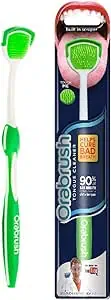
Another popular choice is the Wisdom Fresh Effect Tongue Cleaner. This claims to be soft on the tongue and has built-in antibacterial protection to keep it hygienic between uses. It also has a minty fragrance, although this doesn't seem to be the main reason people love using it.
For a slightly different approach to cleaning your tongue, try the DenTek Orabrush 2 in 1 cleaner and scraper. This looks a bit like a big, flat toothbrush. You use the super soft bristles to dislodge debris from your tongue, then use the built-in scraper to clear it away.
Many users say it is gentler than a traditional tongue scraper – which some see as a pro and others as a con. But the general consensus is that the brushing and scraping combined do leave your tongue feeling really clean.
Best tongue cleaner around. Due to the added little bristles I find it does a much thorough job of the cleaning process than having just the scraper alone. Lasts a long time as well. – Amazon reviwer
Metal tongue scrapers
If you want to cut down on plastic waste or take a more natural approach to cleaning your tongue, a metal tongue scraper may be the best option. These are typically bent into a rounded ‘v' shape. By holding the two handles, you can accurately position the scraper right at the back of your mouth.
They can clean your whole tongue in one stroke, making the process quick and efficient. A stainless steel or copper tongue scraper should be much longer-lasting than a plastic one, so although they cost a little more, they may work out more cost-effective in the long run.
Copper tongue scrapers
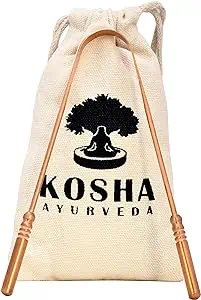
If you're looking for an Ayurvedic tongue scraper that follows the principles of traditional Indian medicine, a copper one is most authentic. Even if this isn't an important consideration for you, many people choose copper for its natural antimicrobial properties.
One of the most popular copper tongue scrapers around is the Kosha Ayurveda Tongue Scraper. It has a wide cleaning edge to reach across the whole tongue, a thick blunt edge for safety, and comfortable grips on the handles to make it easy to manoeuvre.
It also gets good reviews from people who have had trouble with gagging while trying to clean their tongue with a toothbrush:
Easy to use. Doesn't make you gag like a toothbrush can if used to clean your tongue. – Amazon reviewer
Copper tongue scrapers can last for many years if cared for properly. The most important thing is to make sure it dries fully after each use. However, some people report tarnishing after just a few months despite following the care instructions.
Stainless steel tongue scrapers
You'll find a little more variety if you opt for a stainless steel tongue cleaner. HealthAndYoga makes one similar in style to the copper one described above. It's made from surgical grade stainless steel and, unlike some others, it has no synthetic materials on the handles so is 100% metal.
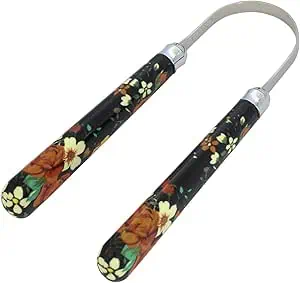
A more premium option is an Amano tongue scraper. These bring a touch of art to your bathroom, with a range of colourful handle designs to choose from. Amano tongue cleaners are dishwasher safe and come in a durable plastic case, which is handy if you travel a lot.
This British company has been producing tongue scrapers since 1992, and they are specially designed to prevent a gag reflex. They aren't the cheapest model available, but they are certainly made to last.
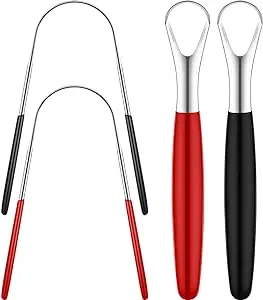
You can also get stainless steel tongue scrapers in a similar design to the traditional plastic ones featured above. This set offers the best of both, with two ‘u'-shaped scrapers and two single-handle designs. This could be a great place to start if you've never used a tongue scraper before and are unsure which style would suit you best.
In the table below is a summary of the different aspects to consider when deciding which type of tongue cleaner is best for you:
[wptb id="26574" not found ]Homemade tongue scrapers
If you search for homemade tongue scrapers online, the most common advice you'll find is simply to use a spoon instead. It's not a bad alternative, but you may not find the shape of a spoon quite as ergonomic as a proper tongue scraper.
It is possible to make a DIY tongue scraper from scratch, like this one. We can't speak for the safety or effectiveness of such a device, though, and unless you have a lot of time on your hands you might decide it's worth just spending those few pounds on Amazon.
Other ways of cleaning your tongue
Many water flossers come with a tongue-cleaning tip which emits a spray of water as you clean your tongue. People with a sensitive gag reflex may struggle with this tongue-cleaning method, but on the other hand it can feel like a more hygienic way to clean your tongue. Check out our guide to the best water flossers if you want to find one that includes a tongue cleaner tip.
Similarly, some premium electric toothbrushes have a special head and a setting specifically for tongue cleaning. The Oral-B Genius 9000 is one such model, but you can read our electric toothbrush guide to discover more options.
How to clean your tongue without a tongue scraper
If you find yourself out without a tongue scraper and in need of a fresher tongue, the edge of a plastic or metal spoon will do quite a good job. Scrape your tongue from the back to the tip and see what you collect.
As we mentioned earlier, you can also brush your tongue with a toothbrush, but this has been shown to be less effective than using a device designed specifically for this purpose.
How to clean your tongue naturally

If you'd prefer not to physically scrape anything along your tongue, you'll probably find that a mouth rinse is the next best way to clean your tongue. There are plenty of natural mouthwashes available to buy in stores and online, or you could try your hand at making your own using baking soda. Our guide to the best mouthwashes in the UK has more information about all of these options.
Regular use of a mouth rinse is a good way to keep your tongue cleaner and your mouth feeling fresh. It's also important to ensure you drink enough water, because dehydration can worsen the buildup of bacteria on the tongue.
Conclusion
Although not widely practised or recommended in the UK, the various benefits of tongue scraping make it a worthwhile addition to your daily dental care routine.
Our advice is to use a tongue scraper rather than a toothbrush, and experiment with a couple of different styles if you don't like the first one you use. Generally the flatter it lies against your tongue, the easier you'll find it to clean your tongue without gagging – especially the back of your tongue.
Don't forget that you should still brush your teeth twice a day and clean between your teeth daily if you want to keep your mouth in top condition. Regular dental checkups will help identify any more serious problems with your tongue, teeth or gums.




